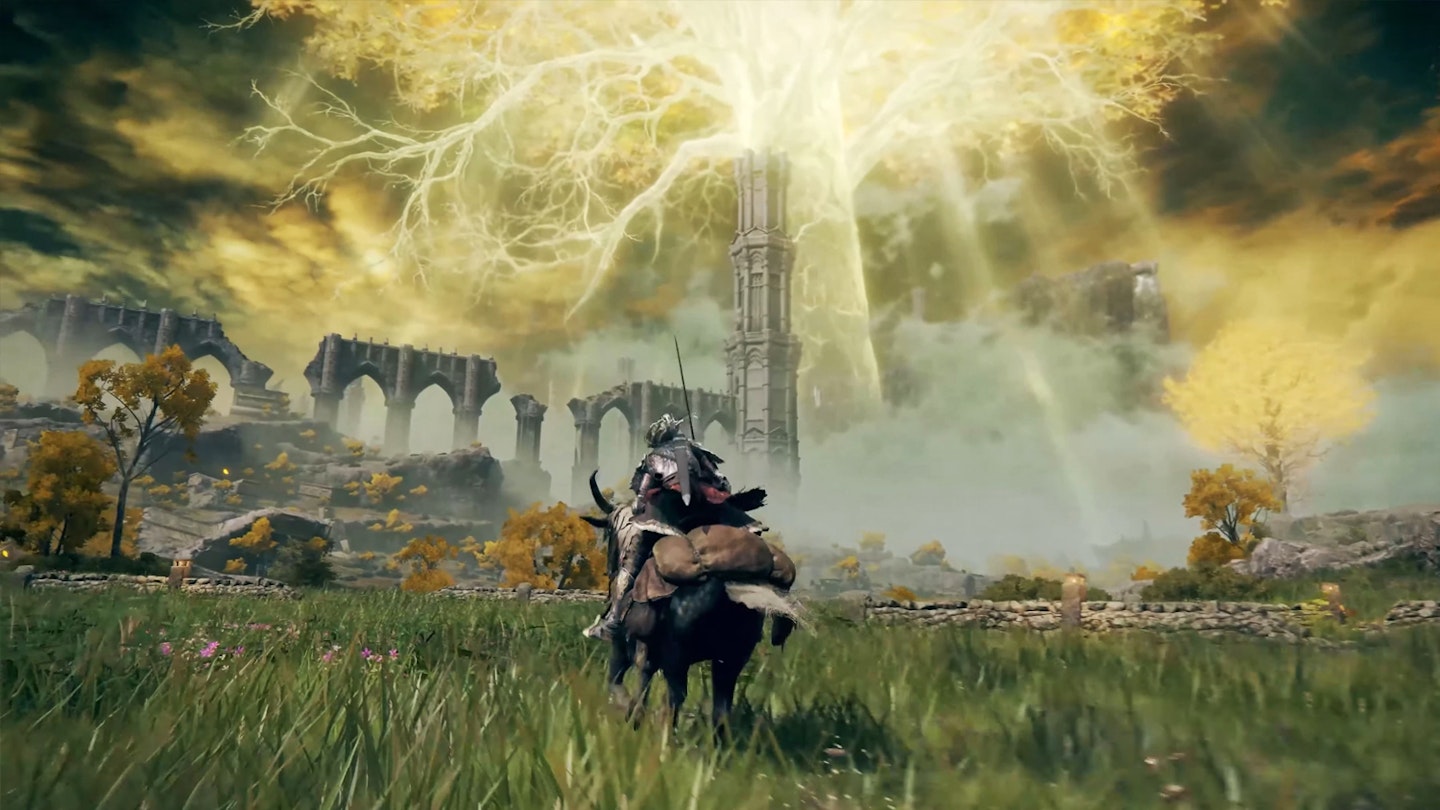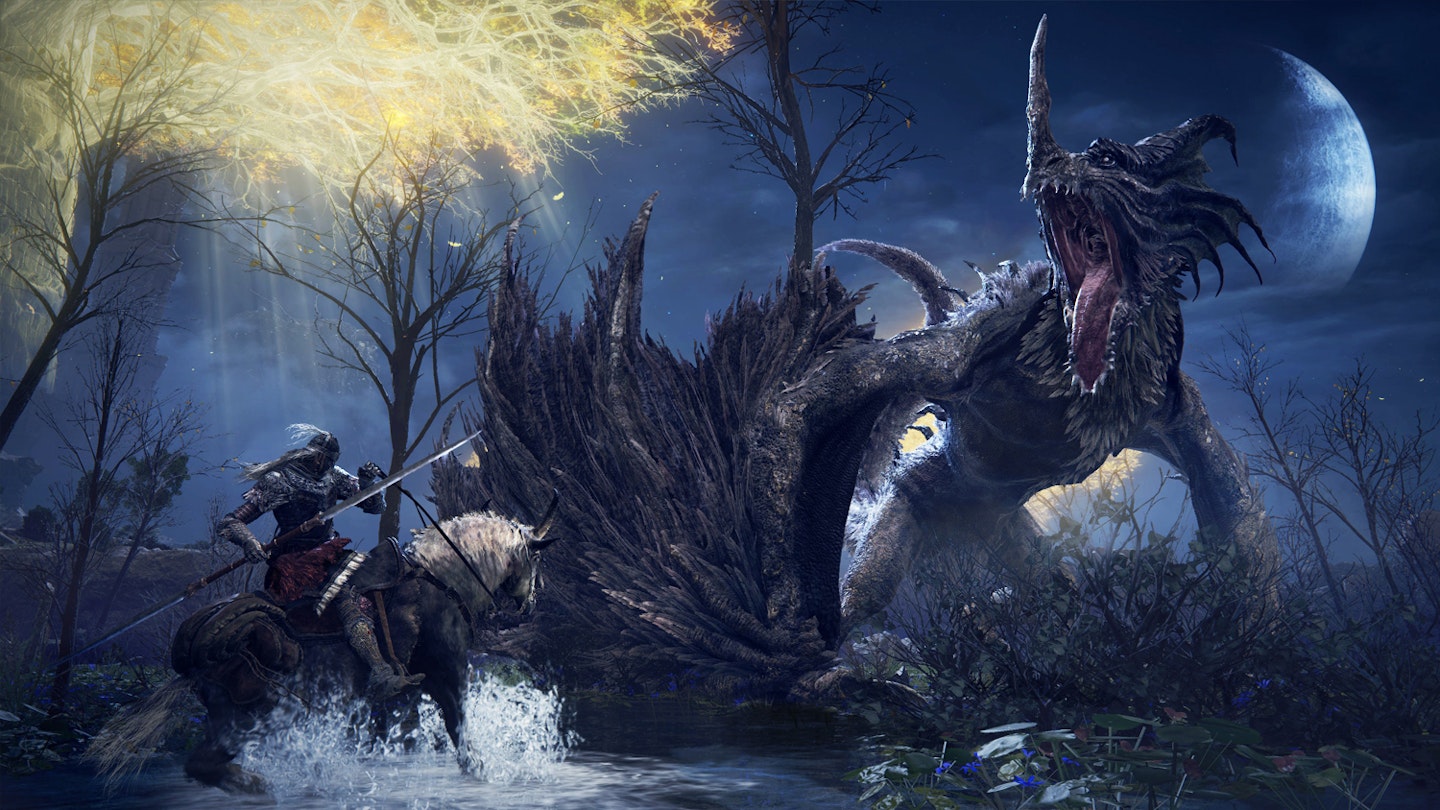It’s both accurate and unfair to call Elden Ring an open world Dark Souls. FromSoftware’s long-awaited new title, crafted in collaboration with George R. R. Martin, has been tantalising players since it was announced way back at E3 2019, initially with little other than the prospect of being an open-world Dark Souls to go on. Now it’s here, it’s easy to say that anyone already hooked on director Hidetaka Miyazaki’s penchant for masochistic dark fantasy gameplay will find themselves well catered for.
Indeed, Elden Ring’s opening hours are fairly Dark-Souls-by-the-numbers – some densely packed lore, a choice of character class, facing a boss battle that’s not meant to be won, then left to explore the world properly. The mechanics are essentially the same as its predecessors too, with attacks dished out on shoulder buttons, functionally identical targeting, dodging, and parrying, and enemies dropping souls when felled, to be spent on levelling up at bonfires. Other than some name changes – runes, rather than souls, and “sites of Lost Grace” rather than bonfires – it’s hard to tell much difference at a glance, other than it all taking place on an open field rather than the tight confines of a dingy castle, or Bloodborne’s gothic Victorian town vibes.

However, it soon becomes clear that Elden Ring has a lot more to offer than being merely “open world Dark Souls, and that it presents those offerings in ways that make it far more accessible to players who may have previously been put off by the reputation or reality of the “Soulsborne” genre.
For one, that open world massively changes how players can approach the game. While sites of Lost Grace will ping out a beacon pointing to the next ‘main’ destination, there’s always the freedom to simply run off in the other direction, where there’s also always something new to discover. Elden Ring’s world is full of stuff to do, whether it’s wading through a cave to tackle some grunts, or finding hidden dungeons, side quests, living objectives that constantly reward players with either raw goods – runes, for levelling up or currency, or materials for crafting – or lore and story, which feels far more present here than in FromSoftware’s previous games.

It also changes how you play. Straight out of the gate, there are enemies populating the world that you have no chance of defeating, at least not straight away, forcing a speedier and stealthier approach to navigating this strange new realm. Plus, while it was always possible to ‘level grind’ in Dark Souls if a particular boss or area was proving too challenging - farming enemies for souls, resting at a bonfire to respawn them, and mowing them down all over again until you had enough souls to purchase a level-up – Elden Ring makes it less of a, well, grind. Simply being able to wander off and kill enemies elsewhere and maybe find something cool, useful, or interesting in the process makes it all far less monotonous, while also providing a sense of progress even if you’re sidelining the main directives.
That’s the essence of what is ultimately the biggest departure that *Elden Ring* takes from its stablemates - it creates a beautiful sense of freedom rather than oppression.
By far the biggest differentiator from Souls, though, is Torrent, a spectral steed that can be summoned at will. It feels perhaps like a nod to Link’s horses in Breath of the Wild, allowing faster traversal of vast plains, but with a supernatural twist. Torrent is capable of vaulting high on ghostly currents, allowing elevated areas to be reached with ease, or zooming through hordes of foes, their arrows or sword swings sailing clean past as you bypass them with ease.
That’s the essence of what is ultimately the biggest departure that Elden Ring takes from its stablemates - it creates a beautiful sense of freedom rather than oppression. Even the world itself, blessed by a giant glowing tree in the distance, feels like it has at least a glimmer of hope to it, without sacrificing the darkness, the fear, the tension that fans of FromSoftware’s works love about them. The monstrous enemies and titanic bosses that populate the world will still require every bit of skill to overcome, and even the lowliest wretch can kill you if you’re not paying attention, but there’s a sense of purpose rather than futility now.
So yes, on a surface level, Elden Ring is an open world Dark Souls, but it’s also so much more. It’s more accessible, without losing the challenge fans of the genre crave, more absorbing thanks to the lore crafted by Martin being better integrated into the world you explore, and more engaging for having a wealth of content to uncover as you do so. This is FromSoftware’s magnum opus, and a masterclass in how to move a genre forward without undermining what went before.
